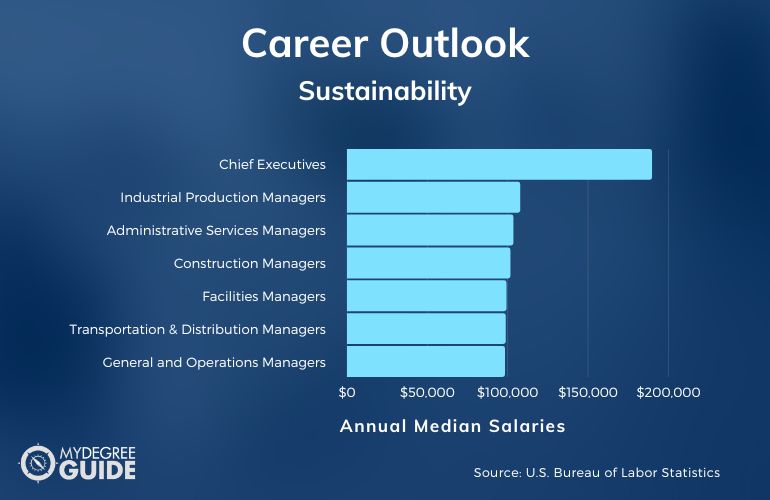If you have a passion for making businesses and the world more sustainable, then you might consider pursuing an MBA in Sustainability.

This advanced degree can help you grow your expertise and become a leader in the drive for sustainability in the corporate world. Through your efforts, you could possibly have an impact on global sustainability as well.
Editorial Listing ShortCode:
With a focus on reducing the footprint of supply chains and creating a more sustainable future for business, this area of study could lead to rewarding opportunities to make a difference in the world.
Online MBA in Sustainability Programs

An MBA in Sustainability is a business degree that is highly specialized in sustainability. Because of this, students will encounter a blend of traditional business coursework alongside courses rooted in environmental sustainability, principles, and theories.
Editorial Listing ShortCode:
Students may take both theoretical and applied courses in sustainable strategy development, where they’ll analyze sustainable business practices and how to implement them. They may also dive into local and global supply chain management, with a focus on how to reduce a supply chain’s ecological footprint.
Other topics students may encounter include:
- Environmental issues, such as water pollution
- Economic impacts of renewable energy
- Finance for sustainability
Students may also take courses in risk management, investing, marketing, and accounting with a focused sustainability slant. You can expect to take courses on data analytics as well in order to learn how to manage data resources effectively and analyze sustainability data and studies.
You will also take courses on sustainable management practices alongside traditional management strategies, such as conflict resolution and ethics. These courses are designed to help prepare students for careers as top executives or leaders at sustainability companies or within companies that are eco-friendly. Professionals with a sustainability MBA might also work as sustainability consultants or directors of social awareness.
Sustainability Careers & Salaries

Since a sustainability MBA offers environmental sustainability courses alongside a business-oriented education, graduates may qualify for a variety of careers.
Many graduates choose to enter leadership positions in sustainability companies, where they might become executives, directors, or managers. In addition to leading operations, they may also help spur new sustainability initiatives within and outside of the company.
According to the Bureau of Labor Statistics, here are the median salaries of potential careers related to business and sustainability.
| Careers | Annual Median Salaries |
| Chief Executives | $189,520 |
| Industrial Production Managers | $107,560 |
| Administrative Services Managers | $103,330 |
| Construction Managers | $101,480 |
| Facilities Managers | $99,030 |
| Transportation, Storage, and Distribution Managers | $98,560 |
| General and Operations Managers | $98,100 |
| Project Management Specialists | $95,370 |
| Occupational Health and Safety Specialists | $78,570 |
| Compliance Officers | $71,690 |
Projected salaries can depend on a number of factors, such as your location, experience, position, and the company you work for.
Graduates may also lead sustainability initiatives for companies and businesses looking to become more eco-friendly and sustainable. They may draft up proposals for a more sustainable supply chain or even for how and where to source more sustainable products.
Editorial Listing ShortCode:
Specialized titles in this field can include compliance specialist, environmental engineer, ecological program manager, sustainability coordinator, VP of operational excellence, and more. Graduates may even discover leadership careers in environmental nonprofits, the federal government, or global sustainability agencies.
Online Sustainable MBA Curriculum & Courses

While sustainability MBA curricula can differ depending on the school, many courses may cover topics like the following:
- Sustainability Strategy Development: In this course, you’ll learn the skills required to develop and implement sustainable business plans and practices.
- Sustainable Supply Chain Management: This course focuses on studying the ins and outs of supply chains, their management, and how to use innovative methods to reduce their footprint.
- Data, Analytics, and Decisions: This course focuses on hands-on analytical skills alongside utilizing data in sustainability and business, managing data resources, and planning outcome-centered analytics projects.
- Leading Change in Organizations: This course focuses on traditional management topics through the lens of sustainability, including change management, group relations, strategy, and more.
- Sustainable Investment Theory and Practice: This course analyzes sustainable investment strategies and theories as well as their organizational implementation.
- Environmental Issues: This course introduces you to the most pressing environmental problems in modern society, including water pollution, climate change, industrialization, and more.
- Energy and Society: In this course, you’ll explore renewable energy methods and their economic impacts, along with the effect of businesses on home energy.
- Circular Value Chain Management: This course examines the idea of transitioning to a circular economy and analyzes whether it would be more effective than the current take-make-waste model.
- Finance for Sustainability: In this course, you’ll explore how firms can access financing for sustainability as well as how the global finance system itself may become more sustainable.
- Principles of Sustainable Management: This course trains managers to effectively build business cases for behaving in sustainable, regenerative ways, and it covers various sustainability frameworks.
Many sustainability MBA programs online or on campus also require a capstone project or thesis, which may involve more research coursework.
How to Choose an Online MBA in Sustainability Program

In order to make the most of your sustainability MBA, it may help to keep these considerations in mind before applying:
- Program format and length. It helps to consider whether you want a fully online learning option or would like a blend of in-person and online studies. Also, consider whether you prefer synchronous or asynchronous coursework.
- Location. Even if you choose an online program, some still require students to complete campus residency requirements. If this is required, you may want to choose a school close to your location. Some local employers may also seek to employ local graduates of MBA programs.
- Career opportunities. You might consider a school’s post-graduation employment rate and its various career resources, such as working with recruiters for graduate placement.
- Program prestige. You might consider choosing a program and school with an excellent reputation in the business and sustainability community.
- Internships and learning resources. You can also consider whether your program offers access to resources like internships, scholarly journals, and innovative software.
It is also helpful to consider cost and factors like out-of-state tuition, which may or may not apply to online learners.
Admissions Requirements

Admissions requirements can vary depending on your school, but here are some common requirements for graduate degrees:
- Transcripts from accredited undergraduate program
- CV or resume
- Letters of recommendation
- Statement of purpose or personal essay
- GRE or GMAT scores (if applicable)
Many schools no longer require the submission of GRE or GMAT scores for graduate admissions. It could be beneficial to check with your school to determine if they are necessary. Some schools also have applicants complete an interview with faculty.
Accreditation

Regional accrediting organizations ensure a standard of quality for colleges and universities. A school can become regionally accredited when it passes a thorough evaluation of its faculty, services, and educational offerings.
Editorial Listing ShortCode:
Before applying to a school, it’s beneficial to determine whether or not it’s accredited by a credible organization, just like when considering online MBA in Operations Management or MBA in Cybersecurity online programs. This is because your school’s accreditation can impact your eligibility for financial aid as well as future career opportunities. There are only a handful of organizations that can offer regional accreditation, and you can find a list of them at the Council for Higher Education Accreditation’s website.
Financial Aid and Scholarships

Many graduate students pursuing an MBA in Sustainability seek financial assistance. Luckily, there are several financing options available to qualifying students.
One option is to consider various scholarship and grant opportunities. Both scholarships and grants are available for all kinds of programs, majors, and specific life situations. Another option is to look into federal and state aid programs. These can provide financing in the form of student loans, and eligibility will vary based on your financial situation and state.
To apply for government aid and determine your eligibility, you can fill out the Free Application for Federal Student Aid (FAFSA). Many employers also offer tuition benefits to workers who are seeking higher education.
What Is an MBA in Sustainability?

An MBA in Sustainability is a business degree with a focus on environmental and social sustainability. Also referred to as a green MBA, this degree focuses heavily on ecological awareness, green technologies, supply chain sustainability, and environmental management.
Woven into this curriculum is also an array of advanced leadership, entrepreneurship, and organizational management coursework to help prepare students for management positions. Coursework may also prepare graduates for careers as sustainability counselors, directors, or top executives. Graduates may even pursue social awareness positions.
What Can You Do with an MBA in Sustainability?

After completing a sustainability MBA program, professionals may go on to pursue careers as sustainability managers, directors, or top executives.
They might work for a variety of employers, including sustainability resource companies or companies that promote an eco-friendly approach. Some graduates also become sustainability consultants or specialists for companies or even directors and project managers for sustainability initiatives within companies.
Others go on to become compliance specialists, industrial production managers, ecological program managers, and transportation, storage, and distribution managers. Related titles may include director of global sustainable agriculture, sustainability coordinator, and VP of operational excellence.
How Long Does It Take to Get a Sustainability MBA Online?

How long it takes to complete a sustainable MBA online depends on a few factors. Generally, if a program consists of 36 credit hours with no thesis requirement, it can be completed in 1 year with full-time, year-round study.
Editorial Listing ShortCode:
If a thesis is required, it can add some additional time. Most masters programs can be completed in 1 year to 2 years. If you are enrolled part-time at any time, this may add to your overall completion time.
How Much Money Can You Make with an MBA in Sustainability?

How much money you can make with an MBA in Sustainability depends on a number of factors, including your location, position, employer, and level of experience.
Many graduates pursue opportunities as sustainability managers, directors, consultants, or specialists. The Bureau of Labor Statistics does not have specific data for these positions, but they can fall under various business and management categories. For instance, the median salary for general and operations managers is $98,100 (Bureau of Labor Statistics).
Professionals may also utilize their skills as industrial production managers or construction managers. The median salaries for these professionals are $107,560 and $101,480, respectively.
What’s the Difference Between an MBA vs. Masters in Sustainability?

An MBA in Sustainability and a masters in sustainability may appear similar on the surface, but they can differ when it comes to their focus.
- MBA in Sustainability: This degree path focuses on equipping students with management skills that can be applied to many areas of business along with practical application.
- Masters in Sustainability: This degree path may be less business focused and more concentrated on sustainability as a whole. It may also be more research intensive.
Both degrees may contain similar courses on sustainability, but an MBA will be more focused on sustainability practices in relation to business and the economy.
Is an MBA in Sustainability Worth It?

Yes, an MBA in Sustainability is worth it for many students. Both the sustainability sector and executive or management sector are forecast to see steady grow, which may result in higher job security.
Editorial Listing ShortCode:
For instance, overall employment for management occupations is projected to grow 8% over the next ten years (Bureau of Labor Statistics). Plus, helping businesses become more sustainable may be a rewarding career as you use your talents and expertise to help preserve the environment.
Universities Offering Online MBA in Sustainability Degree Programs
Methodology: The following school list is in alphabetical order. To be included, a college or university must be regionally accredited and offer degree programs online or in a hybrid format.

Antioch University offers a Master of Business Administration in Sustainable Business, which can be completed entirely online. Potential courses in the curriculum include Earth Systems and Climate Change, Sustainable Business Strategies, and Policy, Law, and the Ethics of Sustainability. The program requires 33 credits and can typically be completed in less than 2 years.
Antioch University is accredited by the Higher Learning Commission.

Bard College offers an MBA in Sustainability. The curriculum integrates the concept of sustainability throughout the program with experiential learning in small classes. The program also provides career support with the opportunity to meet with career planning staff once per semester.
Bard College is accredited by the Middle States Commission on Higher Education.

Concordia University – Wisconsin offers a customizable MBA program with a concentration in Sustainability. The program requires 36 credits, which can typically be completed in less than 2 years. Courses are 8 weeks long. The curriculum includes the opportunity to participate in two experiential learning courses and a capstone.
Concordia University – Wisconsin is accredited by the Higher Learning Commission.

Maharishi International University offers an online MBA with a Sustainable Business specialization. This program focuses on how to operate a profitable business while also helping the environment. The part-time program features three video conferencing live sessions each week. All students at MIU also have the opportunity to practice transcendental meditation.
MIU is accredited by the Higher Learning Commission.

Oklahoma State University offers an online Master of Business Administration with a concentration in Business Sustainability. The online format aims to provide maximum flexibility for full-time working professionals. All courses are taught by the same on-campus faculty, which helps to ensure the same academic quality for on-campus and online programs. The program also includes collaborative virtual activities.
Oklahoma State University is accredited by the Higher Learning Commission.

Prescott College’s MBA in Sustainability Leadership is 100% online and asynchronous, with multiple start dates every year. Classes are small and emphasize applied learning. The curriculum is based on the triple bottom line theory, which means it focuses on balancing an organization’s financial goals with the needs of the environment and the community.
Prescott College is accredited by the Higher Learning Commission.

Presidio Graduate School offers an MBA in Sustainable Solutions with fall and spring start dates. The program requires 53 credits and can typically be completed in 2 years of full-time study or 3.5 years with part-time study. Weekend classes are available.
Presidio Graduate School is accredited by the Western Association of Schools and Colleges Senior College and University Commission.

Southern New Hampshire University offers an MBA with a concentration in Sustainability and Environmental Compliance. This is a self-paced program that can potentially be completed in 1 year. The program focuses on green business practices while offering courses such as Energy and Society, Environment Compliance and Sustainability, and Environment Issues.
SNHU is accredited by the New England Commission of Higher Education, Inc.

The University of Houston – Clear Lake offers a fully online MBA with a concentration in Sustainability. Some courses are also available in face-to-face and hybrid formats. The program requires 36 hours. Depending on the specific course requirements, each one may 8 or 16 weeks long.
The University of Houston-Clear Lake is accredited by the Southern Association of Colleges and Schools Commission on Colleges.

The University of Maine offers the opportunity to earn a Master of Business Administration with a concentration in Sustainability 100% online, potentially in as little as 1 year. The program requires 30 credits, with some being self-paced and some featuring real-time, interactive classes. A rolling admissions process allows for students to apply at any time.
The University of Maine is accredited by the New England Commission of Higher Education.
Getting Your MBA in Sustainability Online

Sustainable business practices have grown in awareness and importance in the modern world, and earning an MBA in Sustainability online may allow you to get involved in making business greener.
This specialized Master of Business Administration program could not only help you grow your business expertise. It could also grow your abilities to improve organizations and their functions through sustainable methods and practices. In addition, earning a sustainability MBA online could be a flexible way to get an advanced degree while maintaining other life and work responsibilities.
If you’re passionate about business and creating sustainable systems, then you might want to start exploring sustainability MBA programs from accredited schools.

